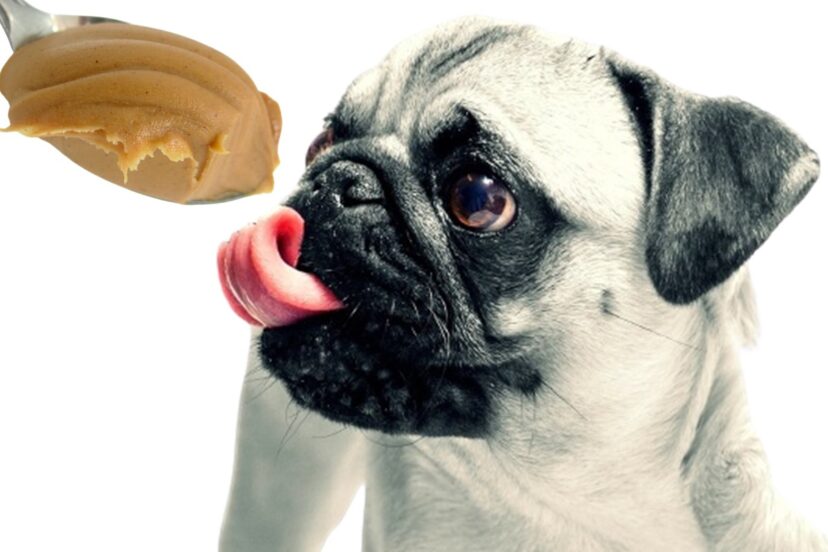Canine Cravings: Exploring Why Dogs Like Peanut Butter 😍
Introduction
As a loving dog parent, I’ve often been curious, why do dogs like peanut butter so much? My furry friend often mysteriously appears at my side from out of nowhere when the jar of peanut butter is opened. Sitting tall, eyes alight, tail energetically wagging at the mere sight of this creamy (or chunky) treat. I decided to dive deeper into understanding this intriguing canine preference.
Understanding Dogs’ Taste Preferences
When exploring why dogs like peanut butter, it’s crucial to begin with an understanding of their taste preferences. Dogs have only about 1,700 taste buds compared to the 9,000 in humans. Despite this limited number, their attraction to certain flavors, especially sweetness, is quite significant. This attraction is an essential factor to consider as it heavily influences their food choices.
Dogs and Sweetness
Dogs are innately drawn to sweet flavors, a preference that is a result of their evolutionary journey. Wild ancestors of dogs might have developed a preference for sweet tastes because sweet foods, such as fruits, provide essential nutrients and are a safer choice compared to bitter foods that could be toxic. Peanut butter’s inherent sweetness, paired with its creamy or chunky texture, captivates dogs, making each spoonful a delightful treat. The sweetness factor not only satisfies their taste buds but also contributes to their keen interest in peanut butter. The sweet and savory blend of peanut butter makes each lick a delightful canine adventure.
Sensitivity to Flavor
In addition to their fondness for sweetness, dogs have a heightened sensitivity to various flavors, even with their limited taste buds. This sensitivity is an adaptation that helps them discern different food items, guiding their dietary choices and preferences. When it comes to peanut butter, this sensitivity plays a significant role. The unique, rich, and complex flavors of peanut butter enthrall dogs, making it a favored choice for a snack or treat. Each lick provides them with a burst of flavors, engaging their taste buds in a delightful experience, and encouraging their affinity for peanut butter.
In essence, the exploration of dogs’ taste preferences, especially their inclination towards sweet flavors and their sensitive palate, provides comprehensive insight into their affection for peanut butter. It reaffirms the importance of offering balanced and moderate portions to ensure that their experience remains enjoyable and health-centric. Understanding these aspects is vital for every dog parent aiming to offer nutritious and pleasing food choices to their beloved pets.
Why Peanut Butter?
Peanut butter is not just tasty but also nutritious. It provides protein, healthy fats, and various vitamins and minerals that contribute to a dog’s overall health. The creamy or crunchy texture of peanut butter also enhances its appeal to dogs, ensuring they not only get nutrients but also enjoy the eating experience.
The Benefits of Peanut Butter for Dogs
Understanding the myriad benefits of peanut butter for dogs provides a clearer insight into why dogs like peanut butter and how it contributes positively to their overall well-being. Peanut butter is more than just a tasty treat for dogs; it’s packed with a wealth of nutritional elements that play a crucial role in maintaining their health and vitality. It’s a rich source of good nutrition, adding valuable dimensions to a dog’s diet when offered in moderation.
Healthy Fats
One of the key nutritional components in peanut butter is healthy fats. Fats are essential in the diet of dogs for various reasons. They provide energy, which is particularly important for active and energetic dogs. The healthy fats in peanut butter also contribute to skin and coat health. A diet with an adequate amount of healthy fats ensures that dogs have a shiny, healthy coat, and well-moisturized skin, reducing issues related to dryness or irritation. It’s the fat content in peanut butter that adds to its creamy texture and rich flavor, making it not only a nutritious addition to a dog’s diet but also a delicious one.
Protein Source
Another remarkable benefit of peanut butter is its protein content. Protein is a crucial nutrient for dogs, contributing significantly to their muscle development and repair. It supports the growth of lean muscle mass, ensuring that dogs have the strength and endurance to engage in daily activities, play, and exercise. The protein in peanut butter complements the dietary protein intake from other sources, ensuring that dogs have a balanced and sufficient protein supply in their diet.
Vitamins and Minerals
Peanut butter is a treasure trove of essential vitamins and minerals that play an integral role in promoting a dog’s health. It contains Vitamin E, an antioxidant that supports immune health, and a range of B vitamins that contribute to a dog’s overall well-being. Minerals such as magnesium, phosphorus, and potassium found in peanut butter aid in bone health, energy production, and maintaining a healthy nervous system. These nutritional elements work synergistically to support various bodily functions, ensuring that dogs not only enjoy the taste of peanut butter but also gain substantial health benefits.
Peanut butter stands out as a nutrient-rich food item that offers a range of health benefits for dogs, including providing healthy fats, protein, and essential vitamins and minerals. These nutritional benefits make peanut butter a worthwhile treat, contributing positively to a dog’s health when included as a part of a balanced diet.
Possible Concerns and Precautions
Allergies
While rare, some dogs might be allergic to peanut butter. Always observe your dog for any adverse reactions after feeding them peanut butter for the first time. While it’s a treat that many dogs enjoy, it’s crucial to note that some dogs may have or develop an allergy to peanut butter. Allergies in dogs can manifest in various ways, including gastrointestinal issues like vomiting and diarrhea, skin irritations, itching, or more severe reactions like anaphylaxis. If your dog is trying peanut butter for the first time, it’s essential to start with a small amount to monitor their reaction. Should any signs of an allergy emerge, immediate veterinary attention is paramount to ensure the dog’s safety and well-being.
Xylitol
Ensure the peanut butter does not contain Xylitol, a sweetener toxic to dogs.
Caloric Content
As wonderful as the benefits of peanut butter are for our furry friends, it’s crucial to be vigilant about the caloric content. Peanut butter is indeed high in calories, which can contribute to unnecessary weight gain if not moderated. One tablespoon of peanut butter contains approximately 90 to 100 calories, and while it’s a fantastic source of protein, healthy fats, and various vitamins and minerals, excessive intake can quickly add up in calories. As pet parents exploring why dogs like peanut butter, it’s imperative to ensure that the love for this treat does not translate into overfeeding, leading to obesity and related health issues in dogs.
To avoid the pitfalls of overfeeding, it’s vital to regulate the portion sizes based on the dog’s size, activity level, and overall health. For smaller dogs, a teaspoonful suffices, while larger breeds may enjoy up to a tablespoon without adverse effects. Integrate peanut butter as an occasional treat rather than a daily dietary addition to maintain a balanced and healthy diet for the dog. Offering peanut butter stuffed in toys or as a special reward is an excellent way to keep the portions in check while letting the dogs relish the delightful taste and nutritional benefits of peanut butter. This balance ensures that the dogs can enjoy their favorite treat without compromising their health and well-being.
Choosing the Right Peanut Butter for Dogs
When pondering why do dogs like peanut butter, choosing the right product is vital. Opt for natural peanut butter or peanut butter without added sugar, salt, or artificial preservatives to ensure it’s safe and healthy for your beloved pet. Reading the label carefully is crucial.
Serving Suggestions
Serving peanut butter to dogs can be a delightful treat for them and a useful tool for pet parents. One popular and effective way to serve peanut butter is by using it in dog toys, particularly those designed for stuffing treats. This method not only provides a delicious surprise for the dog but also stimulates their mind as they work to get to the peanut butter. It’s an excellent method for keeping dogs entertained, especially during moments when they might be left alone. This serving method can also be a useful and stress-free way to administer medication to dogs who are otherwise hesitant to take their medicine. By hiding the pill in a small amount of peanut butter within a toy, dogs can receive their necessary medication while enjoying a beloved treat.
However, as beneficial and enjoyable as peanut butter can be for dogs, it is paramount to exercise moderation. Despite the serving method chosen, ensure that the quantity of peanut butter remains appropriate for the dog’s size and dietary needs. Overconsumption can lead to potential health issues, including weight gain and related complications. Limiting peanut butter servings to occasional treats helps in maintaining a balanced diet while allowing dogs to enjoy the varied textures and flavors they love. Remember, a happy dog is a healthy dog, and moderation is key to ensuring they enjoy their treats while staying fit and vibrant.
Conclusion
Understanding the intriguing canine preference of why do dogs like peanut butter involves exploring their taste preferences, the health benefits of peanut butter, and ensuring it’s fed in moderation. As dog enthusiasts, it’s our responsibility to ensure that our furry friends enjoy their treats while maintaining optimal health.
FAQs
Q1: How much peanut butter can I feed my dog?
A: A teaspoon for smaller dogs and a tablespoon for larger breeds is a safe amount.
Q2: Can all dogs eat peanut butter?
A: While most dogs can eat peanut butter, always introduce it in small amounts and monitor for allergies or reactions. Which could include vomiting, diarrhea, skin irritations, itching or severe reactions like anaphylaxis. Be sure to get immediate veterinary attention if you suspect an allergic reaction.
Q3: What should I look for in peanut butter for dogs?
A: Choose peanut butter without added sugars, salt, or artificial additives. The artificial sweetener Xylitol is toxic to dogs.
Q4: Is crunchy or smooth peanut butter better for dogs?
A: Either is fine, however smooth peanut butter is generally safer as it prevents choking hazards, especially for smaller dogs.
Q5: Why do dogs like peanut butter?
A: Dogs are drawn to the sweet and savory flavor, and they also enjoy the creamy texture. Peanut butter also offers various health benefits including healthy fats, protein, and essential vitamins and minerals.




